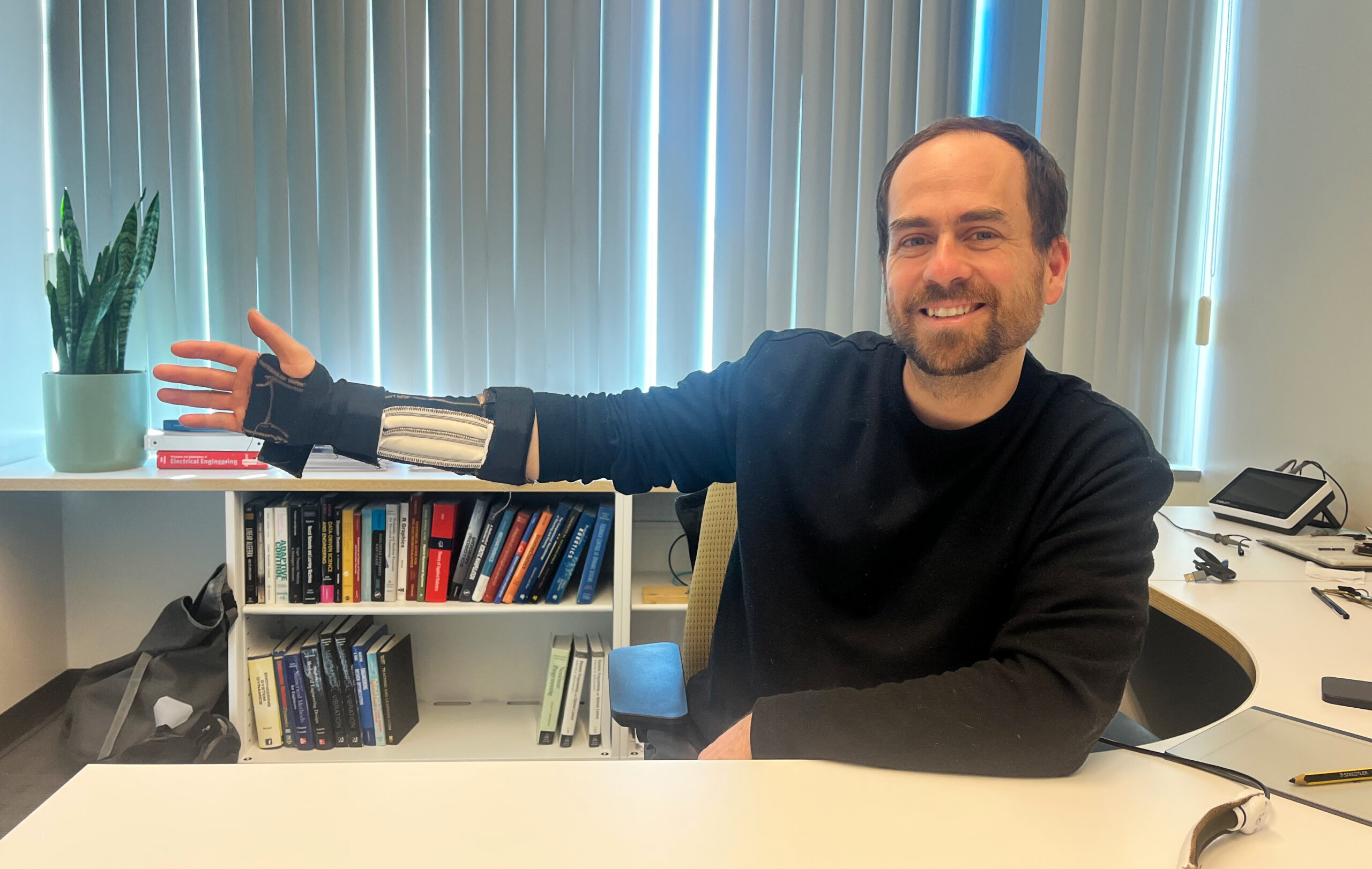Researchers at the University of California, Riverside (UCR), have continued their efforts to enhance the independence of children with cerebral palsy and other physical disabilities through the development of a soft robotic sleeve. This sleeve aims to assist with arm movements, enabling wearers to perform tasks independently. This project is concurrently operating among many other projects in the Bourns College of Engineering (BCOE).
Assistant Professor Jonathan Realmuto, of UCR’s Department of Mechanical Engineering, serves as the project’s principal investigator and works with co-principal investigator Jun Sheng, a UCR assistant professor of Mechanical Engineering, as well as co-principal investigator and clinical partner Terry Sanger, a pediatric neurologist and computational neuroscientist at Children’s Hospital in Orange County and professor at UCI. In an exclusive interview with The Highlander, Professor Sheng shed light on his role in the project and the exciting developments taking place.

When asked about his perspective on the project, Professor Sheng emphasized three main aspects: the soft robot mechanism, the new hardware and software and the new human-robot interface. He expressed a particular interest in the development of the hardware, which serves as the foundation for the robots and detailed how his expertise lies in incorporating materials into soft robot techniques and exploring the possibilities of new hardware designs.
Regarding software development, Professor Sheng highlighted his experience with soft robots and his knowledge of materials. Developing software for this project involves controlling the damping and stiffness of the shape metal alloys and fabric sleeves for their prototypes. The team is also working on increasing the impedance of the soft robots by changing the temperature of smart materials. Through a series of experiments, they aim to categorize and optimize the performance of these soft robots.
Professor Sheng explained that the experiments involve integrating alloys onto the sleeves in various geometric forms, such as wires and springs. They examine the effect of smart materials on impedance and conduct multiple tests using motors to mimic human movement. The team employs a trial-and-error approach, making adjustments based on the results obtained. Students interested in getting involved in the project can contribute to these experiments by assisting with data collection, analysis, and testing.
In terms of future plans, Professor Sheng revealed that hardware development for the project is a priority. The goal is to have the hardware ready by the end of the year and begin tests without active control, focusing on biomimic control on human subjects. The team intends to run iterative designs to improve the hardware based on testing results. However, currently, they can only adjust damping and not stiffness. In the next year, they aim to incorporate biomimic control and simulation platforms to simulate general tasks.
For students interested in joining the project, Professor Sheng mentioned opportunities for involvement. Currently, the team consists of one PhD student working on the hardware, focusing on stiffness, while another PhD student works on damping. The collaboration with Professor Realmuto’s lab allows for an undergraduate student to participate in the project for six months. Professor Sheng welcomes more students to join the project and encourages them to reach out through his email and visit their website for further information.
Professor Sheng expressed his future aspirations, including delving deeper into surgical robot advancements. He encouraged the UCR community to stay engaged and informed about the ongoing projects and emphasized the importance of collaboration between different disciplines to tackle complex challenges in healthcare and robotics
Apart from the robot sleeves project, Professor Sheng briefly mentioned another project he is involved in, which focuses on developing surgical robots for brain tumor removal. This project, funded by the Cancer Research Committee (CRCC), aims to improve the efficacy of therapy through stem cell research and precise cell delivery to different locations. It showcases Professor Sheng’s broad expertise and commitment to advancing the field of robotics.

In a prior interview, Professor Realmuto elaborated on some of the projects that are still in the works. There is a separate project focused on developing soft robot structures for individuals with lower limb disabilities that can facilitate the transition from a sitting to a standing position and assist with postural stability. The project also involves collaboration with Professor Sheng, alongside Professor Erfan Nozari of the BCOE Department of Mechanical Engineering, and Professor David Rosenbaum from the Psychology department. They are joined by Jerry Lob at USC in an ongoing collaboration to build an artificial spinal control system.
The objective with this project is to align this system with the concept of using soft actuators that possess properties similar to biological muscles. By leveraging the understanding of spinal control mechanisms and integrating principles from biology, researchers aim to develop a soft robotic actuator that can mimic the automated functions of muscles controlled by the spinal cord. Despite the potential of this lower limb soft robotic actuator project, it has yet to secure funding. However, there is optimism surrounding the project, as a proposal is currently pending. Realmuto expressed that he is eagerly awaiting the opportunity to advance this project and explore the applications of a super spinal soft robotic actuator.
For students and researchers at UCR who are passionate about robotics, Professor Jun Sheng’s projects provide opportunities to contribute to cutting-edge research and make an impact in the field. Whether it’s through developing soft robot mechanisms, exploring new hardware and software, or collaborating on surgical robot advancements, there are numerous possibilities for students to get involved and shape the future of robotics in healthcare.
To learn more about the project or to get involved with development, feel free to contact Professor Realmuto via his email address, jrealmuto@ucr.edu or Professor Sheng via his email address, junsheng@engr.ucr.edu.








